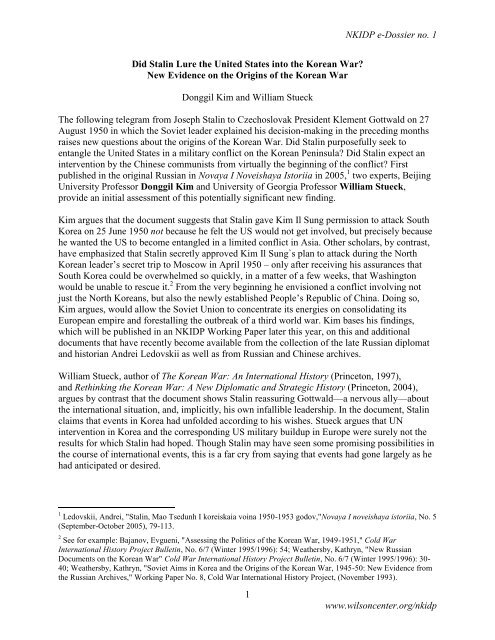Did Stalin Lure the United States into the Korean War? - Woodrow ...
Did Stalin Lure the United States into the Korean War? - Woodrow ...
Did Stalin Lure the United States into the Korean War? - Woodrow ...
Create successful ePaper yourself
Turn your PDF publications into a flip-book with our unique Google optimized e-Paper software.
<strong>Did</strong> <strong>Stalin</strong> <strong>Lure</strong> <strong>the</strong> <strong>United</strong> <strong>States</strong> <strong>into</strong> <strong>the</strong> <strong>Korean</strong> <strong>War</strong>?<br />
New Evidence on <strong>the</strong> Origins of <strong>the</strong> <strong>Korean</strong> <strong>War</strong><br />
Donggil Kim and William Stueck<br />
1<br />
NKIDP e-Dossier no. 1<br />
The following telegram from Joseph <strong>Stalin</strong> to Czechoslovak President Klement Gottwald on 27<br />
August 1950 in which <strong>the</strong> Soviet leader explained his decision-making in <strong>the</strong> preceding months<br />
raises new questions about <strong>the</strong> origins of <strong>the</strong> <strong>Korean</strong> <strong>War</strong>. <strong>Did</strong> <strong>Stalin</strong> purposefully seek to<br />
entangle <strong>the</strong> <strong>United</strong> <strong>States</strong> in a military conflict on <strong>the</strong> <strong>Korean</strong> Peninsula? <strong>Did</strong> <strong>Stalin</strong> expect an<br />
intervention by <strong>the</strong> Chinese communists from virtually <strong>the</strong> beginning of <strong>the</strong> conflict? First<br />
published in <strong>the</strong> original Russian in Novaya I Noveishaya Istoriia in 2005, 1 two experts, Beijing<br />
University Professor Donggil Kim and University of Georgia Professor William Stueck,<br />
provide an initial assessment of this potentially significant new finding.<br />
Kim argues that <strong>the</strong> document suggests that <strong>Stalin</strong> gave Kim Il Sung permission to attack South<br />
Korea on 25 June 1950 not because he felt <strong>the</strong> US would not get involved, but precisely because<br />
he wanted <strong>the</strong> US to become entangled in a limited conflict in Asia. O<strong>the</strong>r scholars, by contrast,<br />
have emphasized that <strong>Stalin</strong> secretly approved Kim Il Sung`s plan to attack during <strong>the</strong> North<br />
<strong>Korean</strong> leader’s secret trip to Moscow in April 1950 – only after receiving his assurances that<br />
South Korea could be overwhelmed so quickly, in a matter of a few weeks, that Washington<br />
would be unable to rescue it. 2 From <strong>the</strong> very beginning he envisioned a conflict involving not<br />
just <strong>the</strong> North <strong>Korean</strong>s, but also <strong>the</strong> newly established People’s Republic of China. Doing so,<br />
Kim argues, would allow <strong>the</strong> Soviet Union to concentrate its energies on consolidating its<br />
European empire and forestalling <strong>the</strong> outbreak of a third world war. Kim bases his findings,<br />
which will be published in an NKIDP Working Paper later this year, on this and additional<br />
documents that have recently become available from <strong>the</strong> collection of <strong>the</strong> late Russian diplomat<br />
and historian Andrei Ledovskii as well as from Russian and Chinese archives.<br />
William Stueck, author of The <strong>Korean</strong> <strong>War</strong>: An International History (Princeton, 1997),<br />
and Rethinking <strong>the</strong> <strong>Korean</strong> <strong>War</strong>: A New Diplomatic and Strategic History (Princeton, 2004),<br />
argues by contrast that <strong>the</strong> document shows <strong>Stalin</strong> reassuring Gottwald—a nervous ally—about<br />
<strong>the</strong> international situation, and, implicitly, his own infallible leadership. In <strong>the</strong> document, <strong>Stalin</strong><br />
claims that events in Korea had unfolded according to his wishes. Stueck argues that UN<br />
intervention in Korea and <strong>the</strong> corresponding US military buildup in Europe were surely not <strong>the</strong><br />
results for which <strong>Stalin</strong> had hoped. Though <strong>Stalin</strong> may have seen some promising possibilities in<br />
<strong>the</strong> course of international events, this is a far cry from saying that events had gone largely as he<br />
had anticipated or desired.<br />
1 Ledovskii, Andrei, "<strong>Stalin</strong>, Mao Tsedunh I koreiskaia voina 1950-1953 godov,"Novaya I noveishaya istoriia, No. 5<br />
(September-October 2005), 79-113.<br />
2 See for example: Bajanov, Evgueni, "Assessing <strong>the</strong> Politics of <strong>the</strong> <strong>Korean</strong> <strong>War</strong>, 1949-1951," Cold <strong>War</strong><br />
International History Project Bulletin, No. 6/7 (Winter 1995/1996): 54; Wea<strong>the</strong>rsby, Kathryn, "New Russian<br />
Documents on <strong>the</strong> <strong>Korean</strong> <strong>War</strong>" Cold <strong>War</strong> International History Project Bulletin, No. 6/7 (Winter 1995/1996): 30-<br />
40; Wea<strong>the</strong>rsby, Kathryn, "Soviet Aims in Korea and <strong>the</strong> Origins of <strong>the</strong> <strong>Korean</strong> <strong>War</strong>, 1945-50: New Evidence from<br />
<strong>the</strong> Russian Archives," Working Paper No. 8, Cold <strong>War</strong> International History Project, (November 1993).<br />
www.wilsoncenter.org/nkidp

















